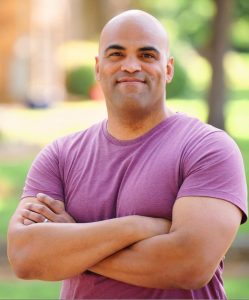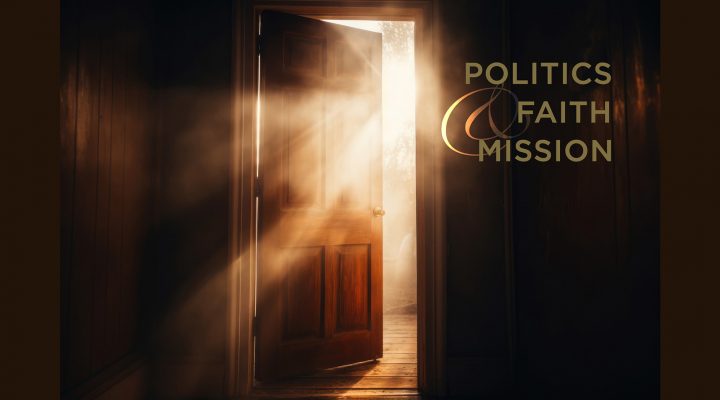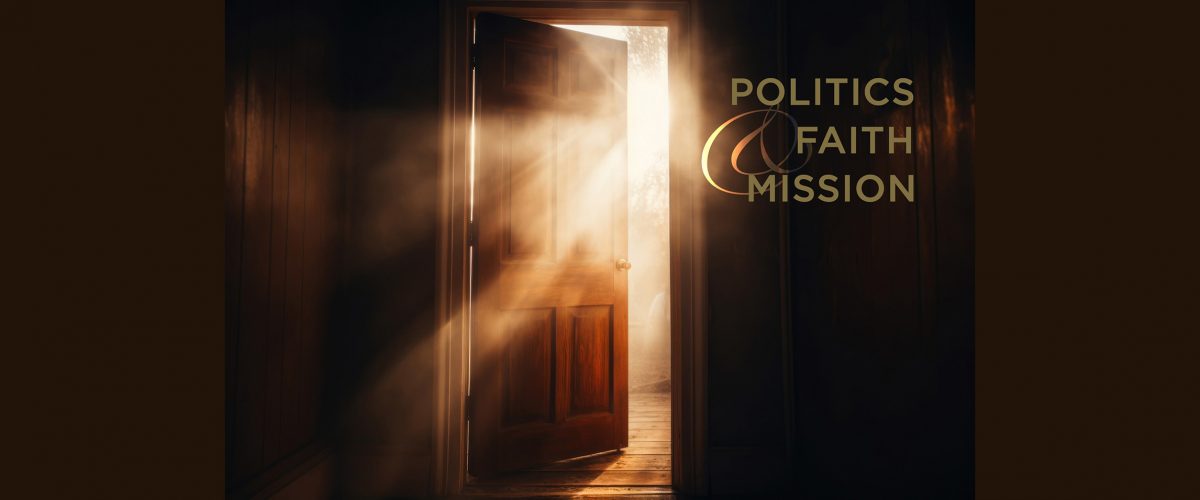Congressman Colin Allred is, as he notes in our interview, a fourth-generation Texan who played football at Baylor University and then in the NFL for five years before an injury ended his professional career and sent him in the direction of law school. Allred serves North Texas in the U.S. House and is currently running against Ted Cruz for a seat in the U.S. Senate. I appreciate his taking the time to answer my questions.
Greg Garrett: Rep. Allred, you have spoken about being in the Capitol on January 6, about texting your wife a possible goodbye, about preparing to defend yourself and your congressional colleagues from the insurrectionists. As you think about the events of January 6 now, what are the things that stand out for you? What would you want Americans to understand about that day and its aftermath?
Colin Allred: I remember sending that text to my wife, a text I never thought I’d have to send in this job. I wrote, “Whatever happens, I love you.” She was at home with our son, who was not yet 2, and she was seven months pregnant with our second son. I wasn’t sure if I was going to make it out. I learned later that Vice President Pence’s security detail were sending the same text to their loved ones.

Colin Allred
When you’re a former professional football player in a situation like that, people will unsurprisingly look to you for protection. So I took my suit jacket off and got ready to take on whatever came through that door.
That day, we came closer to losing our democracy than a lot of people realize, and Ted Cruz is responsible for that. He spread the lie that the election was stolen and was the senator who objected to the certification of the results in an attempt to overturn the will of the American people. But when the mob stormed the Capitol, he hid in a supply closet.
“That day, we came closer to losing our democracy than a lot of people realize, and Ted Cruz is responsible for that.”
As a former voting rights attorney, protecting our free and fair elections and our democracy is extremely important to me.
GG: I spoke to Baylor President Linda Livingstone recently about Baylor’s new motto, “Pro Ecclesia, Pro Texana, Pro Mundo.” How did Baylor prepare you for the work you’re involved in now? What does it mean to serve church, state and world as you think about it?
CA: My story is only possible in Texas. I’m the son of a single mom who taught in Texas public schools. I attended our good public schools in Dallas. I struggled at times growing up — but always had a community to fall back on. Only here could I be where I am today. It was because of my community that I even had the opportunity to get a scholarship to play football at Baylor. The teachers, coaches and my teammates and classmates at Baylor taught me the meaning of leadership and service.
My time at Baylor set me on a path to make it to the NFL, law school and now serving my home in Congress. My time at Baylor deepened my faith and my commitment to Texas and giving back.
As the captain of the Baylor football team, I learned how to bring folks from all backgrounds together toward a common goal and that we can do big things when we work together. That’s something I don’t think Ted Cruz understands. He thinks Texans are small and scared. He wants to divide us. I see us all as Texans first. We are big and brave, and that’s why I am running to be a senator who will represent all 30 million Texans.
GG: You’re running against Sen. Raphael “Ted” Cruz this year, and I know you’re painting a set of contrasts between yourself and the sitting senator. What would you say are the biggest things that distinguish you?
“I know we are not who Ted Cruz says we are because if we were, my story would not have been possible.”
CA: I’m a fourth-generation Texan. I know we are not who Ted Cruz says we are because if we were, my story would not have been possible.
When I was playing football, we had a word for guys like him. We called them “me-guys,” because they were always looking out for themselves. This is a guy who spends hundreds of hours podcasting instead of doing the work for Texas families. He’s voted against bringing manufacturing jobs back to Texas, against securing our border, against lowering the cost of prescription drugs for seniors and capping the cost of insulin at $35 per month for Texans on Medicare. He wants to cut Social Security and Medicare. He ran off to Cancun when Texans were freezing in the dark.
In Texas, we believe in freedom. We believe in the freedom to make your own health care decisions. We know we can secure the border without resorting to cruel, dangerous stunts. We believe in the fundamental promise that if you work hard and play by the rules, you should be able to get ahead, take care of your family, afford a home, send your kids off to school and retire with dignity.
Ted Cruz has had 12 years in the Senate to do what’s right for Texans, and he hasn’t. I will fight for Texas freedoms.
GG: I’m asking all my interview subjects about white Christian nationalism, which scares the pants off me and plenty of other folks. You sit in a House of Representatives chaired by a Christian nationalist. What can you tell us about what you observe about this movement close up and why we should resist it?
CA: Like many Texans, I am proud to be Christian and American. But I also believe we deserve a senator who is committed to representing all Texans — regardless of religion. Texas is one of the most religiously diverse states in the Union, and I will be a senator who listens to Texans no matter their background.
“Ted Cruz and the Christian nationalist movement fight for a future that simply does not include or care about many Texans.”
My Christian values inspire me to fight for a future where seniors can afford their medications, women can make their own health care decisions alongside their families, faith and doctors, and our border is not only secure but reflective of our values as Texans. Ted Cruz and the Christian nationalist movement fight for a future that simply does not include or care about many Texans.
Yes, we’ve seen our government overrun by folks with extreme views. But there are a lot of people doing the work every day on behalf of the American people in a bipartisan way. I have been one of those people while in Congress and was named the most bipartisan member of the Texas delegation. Ted Cruz has been among the most partisan and most extreme legislators our state has ever seen.
I understand we have so much more as Texans that unites us than divides us and will serve with that in mind in the Senate. It’s something Ted Cruz will never understand.
GG: I’m also asking folks where they’re finding hope and joy this year in a complicated and fast-moving world. What are you reading, watching, listening to, or what are you seeing that gives you hope in 2024?
CA: My boys are 3 and 5, and while every moment with them brings me joy, reading them bedtime stories is the greatest joy in my life. And while I miss them when I’m on the campaign trail, the Texans I meet across our great state who share their stories with me bring me so much hope for our future as a state, and for my boys’ future.
This election is about the women in the Panhandle standing up to billionaires who want to ban travel on local roads to access an abortion out of state — and winning. The Republican in Waco who told me she never has supported a Democrat before, but she is supporting me because she is worried about our American democracy. The Border Patrol agents I meet who tell me they are ready for action at the border and desperately need resources to do their jobs. The mom in Dallas who, despite battling terminal cancer, became an advocate for protecting other Texans’ health care while Ted Cruz was trying to take it away. The grandmothers I meet at church in Houston who grab me by the hand and say, “I am praying for you, we need you.”
All across our state I am seeing that we can do this together, because we is more powerful than me.
Greg Garrett teaches creative writing, film, literature and theology classes at Baylor University. He is the author of two dozen books of fiction, nonfiction, memoir and translation, including the critically acclaimed novels Free Bird, Cycling, Shame and The Prodigal. His latest novel is Bastille Day. He is one of America’s leading voices on religion and culture. Two of his recent nonfiction books are In Conversation: Rowan Williams and Greg Garrett and A Long, Long Way: Hollywood’s Unfinished Journey from Racism to Reconciliation. He is a seminary-trained lay preacher in the Episcopal Church. He lives in Austin with his wife, Jeanie, and their two daughters.
More from this series:
Politics, faith and mission: A conversation with Tia Levings
Politics, faith and mission: A conversation with Linda Livingstone
Politics, faith and mission: A conversation with Samuel Perry
Politics, faith and mission: A conversation with Jimi Calhoun
Politics, faith and mission: A conversation with David Dark
Politics, faith and mission: A conversation with Randolph Hollerith
Politics, faith and mission: A conversation with Jillian Mason Shannon
Politics, faith and mission: A conversation with Bishop Mariann Edgar Budde
Politics, faith and mission: A conversation with Vann Newkirk II
Politics, faith and mission: A conversation with Sarah McCammon
Politics, faith and mission: A conversation with Winnie Varghese
Politics, faith and mission: A conversation with Kaitlyn Schiess
Politics, faith and mission: A conversation with Russell Moore
Politics, faith and mission: A BNG interview series on the 2024 election and the Church
Politics, faith and mission: A talk with Tim Alberta on his book and faith journey
Politics, faith and mission: A conversation with Jemar Tisby
Politics, faith and mission: A conversation with Leonard Hamlin Sr.
Politics, faith and mission: A conversation with Ty Seidule
Politics, faith and mission: A conversation with Jessica Wai-Fong Wong


